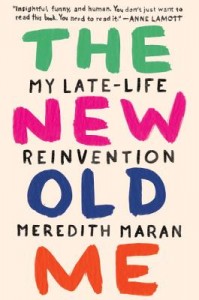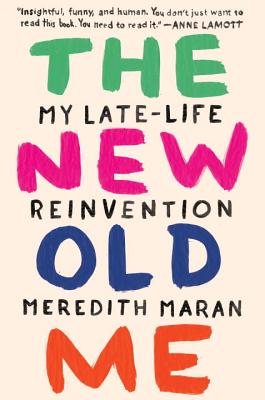 The New Old Me: My Late-Life Reinvention
The New Old Me: My Late-Life Reinvention
by Meredith Maran
Blue Rider Press. 304 pages, $27.
MEREDITH MARAN’S “late-life reinvention” has resulted in a lively, fast-moving memoir, The New Old Me, which recounts the major shifts that took place at the end of the writer’s marriage and with her relocation from the San Francisco Bay Area to Los Angeles five years ago. The memoir is a two-year chronology, with Maran’s experience of growing older interlaced with these stories.
Born in New York City in 1951, the author has published fifteen books, most of them nonfiction.
The new memoir describes the onset of divorce for two women in a legal marriage—a situation barely imaginable in most states before the U.S. Supreme Court’s 2015 ruling. The author’s own romantic history is complex. While still in her teens, Maran ran off with her boyfriend, and a few years later wed a different man. Following their divorce, the author met her first girlfriend, and the two lived together for more than a decade. When that girlfriend moved out, Maran began dating a businesswoman. The pair fell in love, and after California legalized same-sex marriage in that state in 2008, they wed.
The women renovated a Victorian house in Oakland, socializing with family and friends in what Maran paints as a blissful life. Their separation coincides with the start of The New Old Me, when the writer leaves town—and, as eventually will become clear, her marriage—to take a copywriting job in L.A. Although Maran is the one who moved out, she seems to long for her spouse. Throughout the memoir, for example, she refers to the mate left behind as “my wife” rather than by name, as if to hold on to their connection. Near the close of the book, Maran’s father dies. Because he and Maran’s wife had been close, she invites her former spouse to the memorial service, in spite of their now-evident split. Her wife willingly takes part, and Maran’s abashed astonishment at this act of generosity is poignant.
The memoir abounds in wry observations on aging. When it begins, Maran is 61 and living in Oakland; when it closes, she is 63 and living in L.A.—not exactly elder-hood, but close enough to prompt unease. The sight of co-workers at her glitzy ad firm heightens her anxiety: “I figure I’m ten to twenty years older than most of their parents and—gulp—the same age as the younger [ones’] grandmothers,” she says. On top of that, Maran feels the indignity of reporting to a millennial boss. “While we’re clutching at our careers with cold, dying hands, the kids are gamboling past us,” she remarks.
Her sense of being in decline diminishes, but does not disappear. On the one hand, when the company reorganizes and she’s let go, she realizes that material possessions have become less important. “Things just don’t deserve a place at the top,” she comments. At the same time, full acceptance of maturity proves impossible. At one point, she opts for treatment by a plastic surgeon. “Do it!” she commands herself, and feels “ecstatic” with the results. At the same time, she is incredulous: “I can’t believe I actually paid someone to change my face.”
As it becomes clear that her marriage is over, Maran wants to start dating but worries about being too old. When listing her profile with an on-line dating service, she drops four years. Harder to understand—given that she has apparently been living happily with a woman most of her adult life—is her self-description as bi and seeking a man, a depiction she can’t explain. When the guy who shows up for coffee invites her to join him in a ménage à trois, however, she quickly bails. Soon afterward, she meets a young woman and they begin an affair. “How could I have imagined going back to men?” she asks.
The New Old Me is animated by humorous takes on L.A., like the obsession with exercise. Maran describes L.A. workouts as wildly more intense than those of the Bay Area. In her old Berkeley gym, “the first drop of sweat was my signal to stop, sit down, and have a cold drink,” whereas L.A. practice involves “burpees and crunches and rock climbers interspersed with runs around the block, followed by pull-ups using TRX straps hooked to the front of the building.”
Ultimately, do-overs only work if you find meaning in the change and can stick with it. Although Maran is unhappy about being old and unemployed, she clearly hangs on to her spirit. Her grit and determination are especially evident in her hard-won capacity to let go of attachments—not just to an “old wife,” but also to the common notion that the only way to live is as part of a couple. And while The New Old Me is full of action and somewhat light on reflection, we come to appreciate the insistent struggles that led her to that conclusion.
________________________________________________________
Rosemary Booth is a writer and photographer living in Cambridge, Mass.






